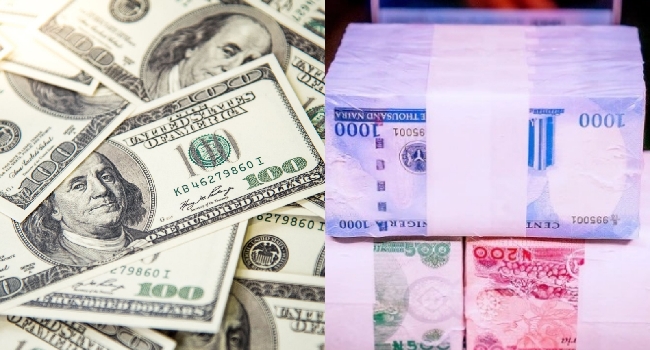In the first quarter of 2024, the naira’s average exchange rate against the US dollar at the Nigerian Foreign Exchange Market (NFEM) fell significantly.
It dropped by 35.53% to ₦1,304.72 per dollar.
This is a sharp decline from ₦841.15 per dollar in the previous quarter.
The Central Bank of Nigeria (CBN) provided this report.

On Wednesday, the naira made a notable recovery, gaining 3.12% against the dollar.
Naira Dollar Drop Summary.
The dollar was quoted at ₦1,543.84 at the Nigerian Autonomous Foreign Exchange Market (NAFEM).
It has a drop from ₦1,592.06 on Tuesday and ₦1,579.22 on Monday, according to FMDQ Securities Exchange Limited data.
Trading activity also saw a boost.
The average turnover at the Nigerian Foreign Exchange Market (NFEM) rose by 61.30%, reaching US$0.20 billion, up from US$0.12 billion in the previous quarter.
The Central Bank of Nigeria’s economic report for the first quarter of 2024 revealed significant foreign exchange inflows.
The total inflow into the economy hit US$11.50 billion, with an increase of 25.69% from US$17.71 billion in the last quarter of 2023.
PEOPLE ALSO READ; “NERC Reveals Amount Of Electricity Debt Owed By Togo, Benin
Inflows through the Bank rose to US$8.09 billion, up from US$5.01 billion.
While autonomous sources contributed US$14.17 billion, compared to US$12.70 billion previously.
These inflows are vital, providing the foreign currency needed for imports, stabilizing the naira, and supporting the economy.
“Outflows Surge, Reserves Stay Strong Despite Fluctuations.”
However, foreign exchange outflows also increased.
Outflows surged by 63.28% to US$10.76 billion, compared to US$6.59 billion in the previous quarter.
According to the CBN, outflows through the Central Bank rose by 80.47% to US$8.93 billion, and autonomous outflows went up by 10.98% to US$1.82 billion.
As a result, net foreign exchange inflows slightly improved by 3.42%, reaching US$11.50 billion, compared to US$11.12 billion in the last quarter.
Net inflows through autonomous sources increased to US$12.35 billion.
While the Bank experienced a net outflow of US$0.85 billion, reversing the previous quarter’s net inflow.
Interestingly, despite these fluctuations, Nigeria’s external reserves remained healthy.
By the end of March 2024, reserves stood at US$32.29 billion, enough to cover 7.1 months of import for goods and services.
As of August 20, 2024, the reserves have grown to US$36.46 billion, according to the Central Bank of Nigeria.

